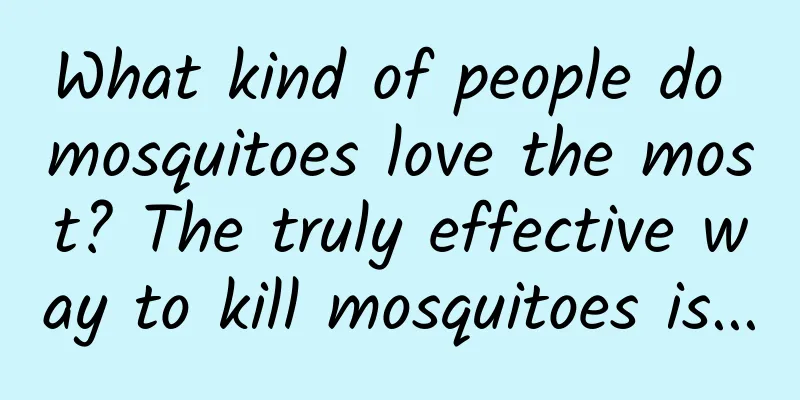What kind of people do mosquitoes love the most? The truly effective way to kill mosquitoes is...

|
“The opposite of love is not hate, but ignoring.” According to this logic, humans have a deep love for mosquitoes. Discussions and research on mosquitoes are definitely the hottest topic in the insect world, regardless of the content. Among the various opinions about mosquitoes, what blood type attracts mosquitoes can be said to be a very hot topic. This is a commonplace question, and there are many related studies. Copyright images in the gallery. Reprinting and using them may lead to copyright disputes. 01 Do mosquitoes prefer O-type blood? In some studies on specific species, mosquitoes do show a preference for blood type: for example, one study found that Aedes aegypti in the laboratory prefers blood type O the most . However, the difference in the blood type they inhale has no effect on the physiological indicators of mosquitoes, such as lifespan, fertility, and health of offspring. It may be purely a difference in "taste" . Another study on Aedes albopictus found that they also prefer to land on subjects with blood type O. In this experiment, although the number of mosquitoes choosing blood type O was the largest, it was only significantly more than blood type A, and there was no statistically significant difference between blood types B and AB. So can we say that the controversy over mosquitoes and blood types is over, since mosquitoes apparently prefer type O blood? No. First, there are many species of mosquitoes, and each species, or even different populations of the same species, including populations in different regions, or wild and long-term laboratory-raised mosquitoes, may have huge differences. Different experimental conditions and methods may also affect the results. For example, a study on Anopheles stephensi found that they prefer AB blood type the most, but dislike O blood type the least. As for Aedes aegypti, which seemed to prefer O blood type the most, other studies have shown a preference for B blood type. Therefore, the mosquito's preference for blood type is still vague and controversial. We can only say that mosquitoes will suck blood regardless of blood type . Mosquitoes of certain species and populations may have a certain preference for blood type, but it is obviously not reasonable to use the research results of a single literature to say that mosquitoes prefer a certain blood type and expand the behavior of a small population under a single experimental condition to all mosquitoes. The reason why we love to talk about what blood type attracts mosquitoes is probably not because mosquitoes care about blood type - it is humans themselves who really like to talk about blood type, height, zodiac sign and other things. Copyright images in the gallery. Reprinting and using them may lead to copyright disputes. 02 Which features attract mosquitoes the most? If you are like me and attract mosquitoes, and when a group of people go out to play, as long as you are there, others are safe, or if you are lucky enough to be insulated from mosquitoes, then the key factor may not be your blood type, but some other more decisive factors. Putting aside blood type, a factor that has been studied over and over for a long time but still remains difficult to determine, it is better to look at other things that we know clearly about the preferences of mosquitoes, so that we can learn from them and control them. When it comes to the question of "whose blood tastes better", different factions within mosquitoes will first have to fight. Different mosquitoes have obvious preferences for the blood of different species. In fact, not all mosquitoes like to suck human blood. Some species prefer other mammals, birds, reptiles and amphibians, and the same species of mosquitoes may have different preferences in populations in different regions . One species of mosquito (Uranotaenia sapphirina) has a more unique taste, feeding on annelids, such as earthworms and leeches. These mosquitoes are naturally very sensitive to information related to the animals that are the first choice on their menu, such as smell, body temperature and sound. What we care most about is, of course, what the mosquitoes that like human blood the most like about us: "What do you like about me? Can't I change it?" For parasites that feed on warm-blooded animals, including mosquitoes, there are two signals that humans emit that are most irresistible to them: heat and carbon dioxide . In nature, a constant body temperature higher than the ambient temperature is a hallmark of warm-blooded animals, and all living animals exhale carbon dioxide. Using these two as the most critical host positioning information is also the best choice made by evolution. For the several blood-sucking insects I have worked with: mosquitoes, bedbugs, and stable flies, they always respond most strongly to heat and carbon dioxide signals among all the attractants. In the laboratory, even without food, these two will trigger strong foraging behavior, more effective than "Pavlov's tuning fork." Copyright images in the gallery. Reprinting and using them may lead to copyright disputes. Once when I was adding water to a bottle to feed mosquitoes, I accidentally turned the tap to hot water, and the mosquitoes launched a crazy attack on the water bottle. How can you expect these mosquitoes to stop just because you have a certain blood type when they are eager to try hot water? If you have an active metabolism, a higher body temperature, and exhale more carbon dioxide, you may become a "hot commodity" in the eyes of mosquitoes. For example, pregnant women, people who are doing strenuous exercise, and people who drink alcohol are more likely to be targeted by mosquitoes. Mosquitoes have a keen sense of smell, so the smell of humans is also a focus of their investigation. Heat and carbon dioxide let mosquitoes know that there is a "warm-blooded big enemy" that may be delicious. To know whether this enemy is their favorite cuisine (such as humans), or even whether it is their favorite dish in their favorite cuisine, mosquitoes need to use their sense of smell to further taste it. Lactic acid is a well-known compound that attracts mosquitoes and other blood-sucking insects . Lactic acid belongs to the carboxylic acids , a large class of organic compounds that are responsible for mosquitoes' interest in us. Other metabolites , such as ammonia, and unique substances produced by the human surface flora can further stimulate the mosquito's appetite. Many compounds are not very attractive to mosquitoes when they exist alone, but when they are combined together, they form a unique host scent that mosquitoes yearn for. On the other hand, if these odors are combined cleverly enough, even if they do not come from the human body, they can still attract mosquitoes that want to have a full meal. For example, the "infamous" Limburger cheese, because its ingredients are similar to the unpleasant odor produced by the human body, can even be used as trap bait to lure mosquitoes. Copyright images in the gallery. Reprinting and using them may lead to copyright disputes. So can we use this property to make a super double "Limburger cheese" to lure all mosquitoes in and kill them? In theory, it is feasible, but there are considerable difficulties in practice. Mosquitoes and many other blood-sucking insects are also sensitive to the smell of humans or other hosts, but they generally prioritize it over heat and carbon dioxide. Attractant compounds need heat and carbon dioxide to really work, and often the latter is essential, and other attractants are just icing on the cake. Because of this, it is difficult to develop traps or baits that are effective in attracting mosquitoes and other blood-sucking insects. It is very difficult to integrate enough heat and carbon dioxide into traps or baits to match the human body's attraction. Although the carbon dioxide cylinders used in the laboratory are large and can fill the tank, they cannot be widely used. Although there are designs that use chemical reactions to generate carbon dioxide, some of them have been commercialized, the amount of carbon dioxide generated is too small to be of practical use. Dry ice generates a large amount of carbon dioxide, but it is inconvenient to store and transport, evaporates quickly, and there is a risk of frostbite. The constant heat that simulates human body temperature also requires electricity. In general, it is still a big problem to use simple and cheap "cooking packs" to deal with mosquitoes like using cockroach poison bait to deal with cockroaches . Copyright images in the gallery. Reprinting and using them may lead to copyright disputes. Everyone's smell is relatively stable, so if you are a mosquito-attracting alien, you may have to be a mosquito-attracting alien for the rest of your life. Other people who are born with "unusual smells" not only do not attract mosquitoes very much, but can even emit some smells that mosquitoes hate. For example, studies have found that the combination of aldehydes and ketone compounds on some people's bodies makes mosquitoes stay away, giving them a natural mosquito-repellent barrier . Scientists will certainly not miss such an opportunity, and hope that further research based on these "chosen ones" will allow us to use the same mosquito repellent in the future. For now, we mosquito-loving aliens should just do a good job of physical isolation, and actively rely on mosquito coils and DEET, and try our best to have a pain-free summer! References: [1] Prasadini, Manushika,et al. "Blood feeding preference of female Aedes aegypti mosquitoes forhuman blood group types and its impact on their fecundity: implications forvector control." American Journal of Entomology 3.2 (2019):43-48. [2] Shirai, Yoshikazu, etal. "Landing preference of Aedes albopictus (Diptera: Culicidae) on humanskin among ABO blood groups, secretors or nonsecretors, and ABHantigens." Journal of medical entomology 41.4 (2004): 796-799. [3] Anjomruz, Mehdi, etal. "Preferential feeding success of laboratory reared Anopheles stephensimosquitoes according to ABO blood group status." Actatropica 140 (2014): 118-123. [4] Khan, ShahmshadAhmed, Akwashiki Ombugadu, and Saboor Ahmad. "Host‐seeking behavior and fecundity of the female Aedes aegypti to human blood types." PestManagement Science 78.1 (2022): 321‐328. [5] De Obaldia, MariaElena, et al. "Differential mosquito attraction to humans is associatedwith skin-derived carboxylic acid levels." Cell 185.22 (2022):4099-4116. [6] Logan, James G., etal. "Arm-in-cage testing of natural human-derived mosquitorepellents." Malaria journal 9.1 (2010): 1-10. Author: ChenZ, PhD in Entomology Reviewer: Yin Haisheng, Senior Engineer, Researcher-level, Shanghai Insect Museum, Chinese Academy of Sciences Editor-in-charge: Yang Yaping |
Recommend
Jilin 2022: Achieve social zero in one week! Can the lockdown be lifted after 14 days of social quarantine? How long will it take to be unblocked?
In recent days, the local epidemic in Jilin Provi...
iOS 12.4.1 released, may fix jailbreak vulnerability
Apple recently released the official version of i...
Baidu Search oCPC Product Manual
This article shares with you the latest "Bai...
Baidu Ai Purchasing cooperation introduction flow, what is the platform for Baidu Ai Purchasing cooperation?
Baidu AiPurchasing is a global procurement platfo...
How to clean and maintain hiking shoes?
Hiking shoes are shoes specially designed for mou...
In his more than 60 years of scientific research career, he led his team to develop a series of "firsts" in Chinese semiconductors | Time Letter
In July 1977, a semiconductor scientist spoke at ...
Who is Animal of the Year 2021?
if Choose one for the past 2021 Animal of the Yea...
[Practical Application] How to use these 7 types of traffic to create a hit product?
What is a hot product? What are the factors that ...
When doing fission activities, how can we continuously obtain seed users?
There are many techniques for acquiring seed user...
The "spider" hunting scene billions of years ago was "photographed" in amber
Ecological studies on fossil spider species in Cr...
I have a P2P platform promotion secret book worth millions. Would you mind sharing it with me?
1. Secret of magic skill: one pain point + three ...
The largest range of rain and snow this year starts today! How to judge whether it is snowing or raining?
From January 20th to 24th, This year, the largest...
The World Cup has changed: people are more enthusiastic about buying lottery tickets than watching the games
When the World Cup group stage was not over yet, t...
Artificial intelligence! This is good stuff because it can help astronomers find gravitational waves
Hey, HAL, can you help us find black hole impacts...
How much does it cost to produce Zhangye Printing Mini Program? Zhangye printing and printing applet production price inquiry
In order to better penetrate into various industr...









